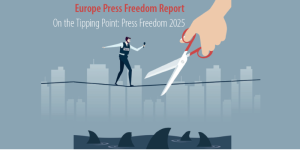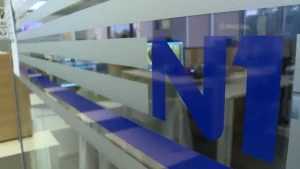Seated at a table with his wife and a colleague in the small town of Leskovac, Dragan Marinkovic was looking forward to a meal at his favorite restaurant.
Then a stranger approached and started to threaten Marinkovic, who is executive editor of the Serbian news website Resetka.
The reason, Marinkovic told VOA’s Serbian Service: a story Resetka had published about the death of a bodyguard who was assigned to a city official.
Threats are not uncommon for journalists in Serbia.
“Anyone can come to you on a street, or wherever, slap you a couple of times, and get away with it [even] while you are accompanied with friends or family,” said Marinkovic.
The Council of Europe (COE) platform to promote the protection of journalism has cited Marinkovic’s case and those of two other Serbian journalists threatened in recent months.
Dragojlo Blagojević, the editor of the magazine DrvoTehnika, received death threats in an anonymous call in July after reporting on the logging industry; and hooligans threatened Brankica Stankovic, of Insajder TV, during a basketball game in May.
Free expression and media rights groups have also separately pointed to a deteriorating climate for journalism in the country.
In Marinkovic’s case from March, the journalist says the man verbally assaulted him and made death threats.
At first, Marinkovic tried to reason with the stranger.
“We tried to talk to [the] person who approached. He started threatening and mentioning an influential local politician,” Marinkovic said, declining to name the politician. “I telephoned the local politician to ask why a man was bothering us.”
At that point, Marinkovic said, the assailant grabbed the journalist’s phone and left the restaurant.
“He came back after several minutes, continued with threats, so we left,” Marinkovic said.
Marinkovic was able to retrieve his phone, and he later wrote an editorial about the encounter.
That resulted in the police and a local prosecutor’s office investigating. But so far, he said, there have been no updates.
Threats are a regular challenge for local journalists in Serbia, Marinkovic said. He has experienced three similar incidents.
In nearly all cases, he said, authorities are not able to identify the suspects “so the investigation goes blunt.”
A database by the Independent Journalists’ Association of Serbia has recorded 60 cases of attacks, threats or intimidation since the start of the year.
And while Serbia improved its ranking in the 2022 Press Freedom Index and is noted for its award-winning investigative journalism, media watchdog Reporters Without Borders cited challenges including political pressure and impunity in attacks on media.
The Ministry of Culture and Information told VOA that it is dedicated to the integrity of journalism, and it cited platforms and services set up to assist those under attack.
As part of its “dedicated, transparent work on improving the environment,” the government established a working group focused on media safety and protection, which meets monthly, the ministry said. The president, vice president and other representatives attend those meetings.
Subtle warning
Jelena Zoric, an award-winning investigative reporter who contributes to the Balkan Investigative Reporting Network and the weekly Vreme, has received threats against her family.
It started when Zoric reported on the alleged connections of state security officials to what’s known as the Jovanjica case, in which an organic farm apparently was used as a front for a marijuana operation.
A high-ranking official, who is facing accusations in an unrelated case, made claims in a TV interview about Zoric’s sources and falsely attributed statements from her brother about Zoric’s work.
“Mentioning my brother’s name in public, via television broadcast, I see as a threat,” said Zoric.
The journalist also received disturbing notes from people she believes are connected to the case.
But, she said, “I am not comfortable to describe my feelings while threatened and what affects me the most, because I do not want them to know how they can get to me.”
Zoric reported the threats to authorities and described the reaction from officials as encouraging.
But she does not believe that authorities always take all the necessary steps in dealing with cases of attacked or threatened journalists.
And sometimes, she said, the threats are less direct.
“The most dangerous threats are the ones that are most difficult to prove,” she said. “Getting messages on your doorstep falsely showing concern on your behalf or wishing you and your family good health.
“I am aware of an old traditional criminal saying: The mob usually blows a kiss before shooting.”
‘Hostile and dangerous environment’
Serbia is among the European countries where journalists are under frequent threat, the Vienna-based International Press Institute says.
“There is a constant increase of attacks, death threats and defamatory campaigns against journalists,” the IPI’s Jamie Wiseman told VOA earlier this year. “Failure to solve those cases boosts a hostile and dangerous environment for journalists.”
Wiseman, who worked on Defending Press Freedom in Times of Tension and Conflict — a report produced by COE partner organizations including the IPI — was part of a delegation to Serbia in 2021.
“We saw an instance of political will, but also ambivalence shown by different bodies on how thorough the threats and intimidations should be investigated,” Wiseman said.
Teresa Ribeiro, the representative on freedom of the media at the Organization for Security and Cooperation in Europe, believes the key to improving the situation is the full implementation of a Media Strategy and Action Plan that Serbian authorities adopted in 2020.
The document, developed in cooperation with the European Union, OSCE, the Norwegian Embassy and the Konrad Adenauer Foundation — a German political party foundation — aimed to safeguard Serbia`s press freedom and regulate the development of media markets until 2025.
Ribeiro visited Serbia in July and spoke with representatives of the government, media and civil sector.
“There are challenges and gaps that need to be overcome,” she told VOA.
Riberio praised some government initiatives, including the working group for the safety of journalists and a 24-hour telephone line offering access to free legal advice for media workers who are attacked.
But, she said, “There is a need for more action and political commitment to create a safer, more free, functional and pluralistic media environment.”
The Ministry of Culture and Information also cited the working group and the helpline. In addition, the ministry said, the public prosecutor’s office is under orders to “act immediately” on reports of criminal acts directed at journalists.
Marinkovic, of Resetka, believes Serbia’s journalists must “put more courage in what we do,” telling VOA, “Journalism, freedom and democracy are under threat in this country.”
The country’s media should stand up against efforts to intimidate or interfere with their work, Marinkovic said, adding that journalists “should defend the public interest and not report in favor of local politicians and powerful people.”
This story originated in VOA’s Serbian Service.




